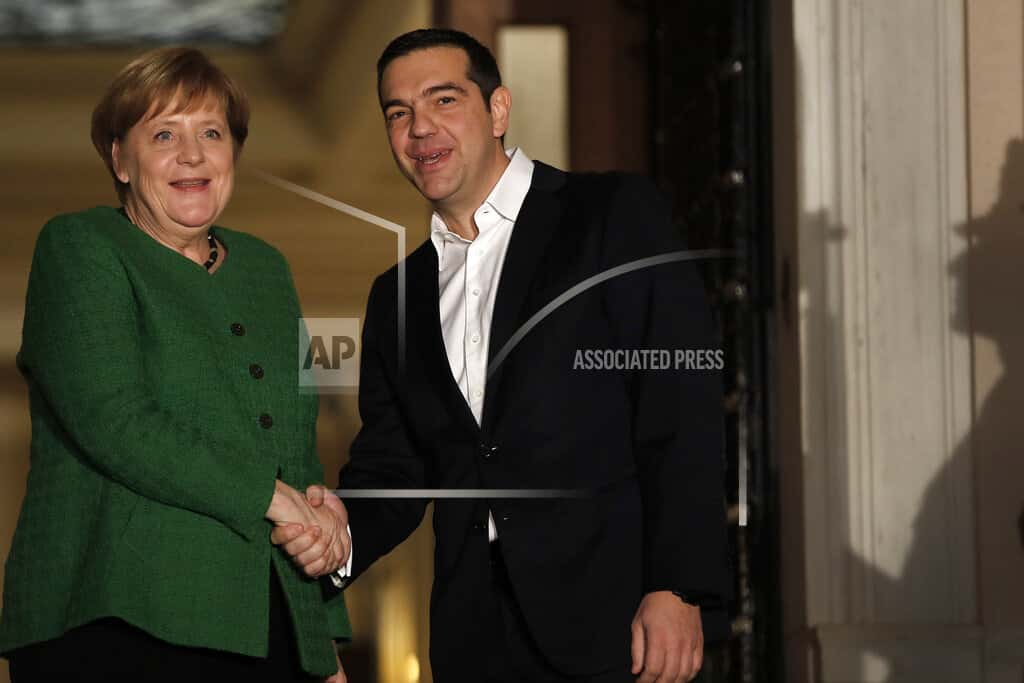
ATHENS, Greece (AP) — German Chancellor Angela Merkel held talks with Greek Prime Minister Alexis Tsipras in Athens Thursday, with Greek authorities banning demonstrations in a large part of the capital’s center and shutting down streets and subway stations for security reasons.
Around 2,000 officers, a police helicopter and drones were deployed for the visit, which ends Friday afternoon.
Germany was the largest single contributor to the three international bailout packages Greece received from 2010-2018 as it struggled through a dramatic financial crisis which almost saw it crash out of the eurozone. But Germany was also seen by many Greeks as one of the main enforcers of stringent austerity measures, including tax hikes and pension and salary cuts, imposed in return for the rescue loans.
Far-right and far-left groups have planned separate protests in Athens later Thursday against Merkel’s visit, but police said no demonstrators would be allowed anywhere near the chancellor.
In a televised preliminary chat with Tsipras before the talks, Merkel highlighted the improvement of Greece’s finances following the bailouts.
“Difficult years have passed but we succeeded in strengthening the European spirit,” she said. “The Greek people went through a very difficult phase and I would like to offer thanks for what Greece has achieved despite the financial difficulties and the tough (austerity) measures, and for what Greece is achieving even now.”
Merkel and Tsipras have met in person many times over the course of the past few years, but this is the first time the German chancellor visits Athens during Tsipras’ government. He came to power in a January 2015 election on a strongly anti-bailout and anti-Merkel campaign, famously once declaring during a campaign speech before European elections: “Go back, Mrs. Merkel!”
Relations have since warmed, and Tsipras dropped his virulent anti-bailout stance, implementing the reforms demanded by Greece’s creditors.
“The last time you visited was at the height of the crisis,” Tsipras told Merkel Thursday. “Now you are coming to a different Greece, which after great difficulties managed to overcome the (financial) crisis.”
He added that despite “differences of views, confrontations and disagreements,” Greece and Germany have since managed to achieve a good relationship.
Greece saw its economy shrink by a quarter during the crisis, with unemployment reaching highs of 28 percent, and 58 percent for young people. The jobless rate has since fallen to just below 19 percent.
Greece emerged from its third and final bailout in August last year, but its economy will remain under strict supervision and it has pledged further reforms to ensure its finances remain on track.
Apart from the financial crisis, the two leaders are expected to discuss migration, an issue on which the positions of Tsipras and Merkel have been relatively close, as well as the name deal Greece reached with neighboring Macedonia.
Under the deal reached last year, the former Yugoslav republic will be renamed North Macedonia in return for Greece dropping its objections to the country joining NATO and eventually the European Union. Greece argues use of the term “Macedonia” implies territorial claims on its own northern province of the same name, and usurps its ancient Greek heritage.
The deal has met with vociferous opposition in both Greece and Macedonia, where critics accused their respective governments of making too many concessions to the other side. The issue is threatening Tsipras’ coalition government, with the head of the junior coalition Independent Greeks party, Defense Minister Panos Kammenos, saying he could leave the government if it goes through.
Germany has made it clear it considers the name deal a historic opportunity.



